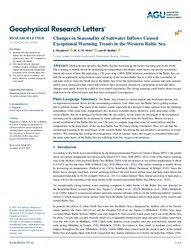Changes in Seasonality of Saltwater Inflows Caused Exceptional Warming Trends in the Western Baltic Sea
Persistent URL: http://resolver.sub.uni-goettingen.de/purl?gldocs-11858/10846
 |
Dokument öffnen: |
During the last decades, the Baltic Sea has been among the fastest warming seas in the world. The warming is mainly driven by increasing air temperatures but deeper water layers can also be warmed by lateral advection of heat. By analyzing a 159 years long (1850–2008) hindcast simulation of the Baltic Sea, we link the exceptionally strong bottom water warming in the western Baltic Sea to a shift in the seasonality of saltwater inflows from the North Sea to the Baltic Sea. Over the model period, warm summer and early autumn inflows have increased while cold winter inflows have decreased. Sensitivity experiments reveal that these changes were partly driven by a shift in river runoff seasonality. The strong warming could lead to faster oxygen depletion in the affected layers and thus have ecological consequences.
Salt import between June and October is highly correlated with the annual sub‐thermocline temperature maximum in the western Baltic Sea.
The shift in inflow seasonality was partly caused by seasonal changes in river runoff.
Statistik:
ZugriffsstatistikSammlung:
- Geographie, Hydrologie [454]
Schlagworte:
Baltic Seasaltwater inflows
salinity dynamics
global warming
water temperature
regional climate variability

